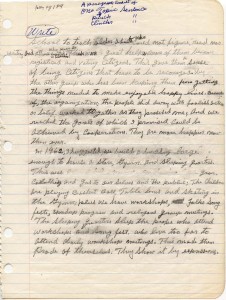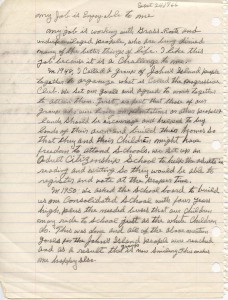This semester, the Avery Research Center has greatly benefited from the services of three interns. In today’s post, TJ Fielder, a senior and political science major at the College of Charleston, shares some of what he learned as he worked with the Esau Jenkins papers.
History is all around us. As a student at the College of Charleston, I never took the time to recognize the vast history that surrounds me. It was not until my senior year at the college that I was granted the opportunity to intern at one of the nation’s most fascinating research centers and archival museums.
The Avery Research Center located in downtown Charleston, South Carolina is the home to many primary artifacts, documents, and oral recordings. With a huge focus on the Civil Rights Movement, I often found myself reading articles and personal letters and looking through photos that captured many of the civil rights leaders in that era. Through the internship and the time I spent at the center, I was able to research the life and contributions of a prominent community leader in the Charleston County Area. Esau Jenkins broke barriers and paved the way for many in his community to abandon poverty and achieve equality through education.
Esau Jenkins was born in 1910 on Johns Island, South Carolina. While in the 4th grade, attending Legareville Elementary School, he lost his mother at the age of 9 and had to quit school to bring in money for his family. He worked in Charleston on a boat, and in 1926, at the age of 16, Esau Jenkins married Janie Elizabeth Jones. Through this marriage the two had 13 children. It was the people in his community that motivated him to advocate for change. Experiencing the poverty and underprivileged people, he took it upon himself to make things better.
 In 1948, Esau Jenkins established the Progressive Club in efforts to combat the state of the people living on John’s Island and the surrounding areas. He knew the importance of citizenship, registration, and voting. The lack of education within his community was a condition that Jenkins refused to accept for his people. He sought to teach the people on John’s Island the importance of political education and the value in working together. He theorized that by being politically educated things can change; his first task was to get the people registered. In order to get respect and have a voice, one must be a registered citizen. Through the Citizens’ Committee, he held classes in his bus that focused on the United States Constitution; in order to be a registered citizen, one must read the Constitution in its entirety. Jenkins would read to the people and collectively they would comprehend the meaning of the document.
In 1948, Esau Jenkins established the Progressive Club in efforts to combat the state of the people living on John’s Island and the surrounding areas. He knew the importance of citizenship, registration, and voting. The lack of education within his community was a condition that Jenkins refused to accept for his people. He sought to teach the people on John’s Island the importance of political education and the value in working together. He theorized that by being politically educated things can change; his first task was to get the people registered. In order to get respect and have a voice, one must be a registered citizen. Through the Citizens’ Committee, he held classes in his bus that focused on the United States Constitution; in order to be a registered citizen, one must read the Constitution in its entirety. Jenkins would read to the people and collectively they would comprehend the meaning of the document.
The Progressive Club, Jenkins, and fellow community leaders all sought to make changes for the people in the Community. They wanted to obliterate ignorance, promote social, educational and civic welfare, and to combat juvenile delinquency. Through this mission Jenkins drafted a budget proposal to open a Day Care for Pre-School age children and an Evening Program for Youth up to the age of 21. The two projects were created to allow students to go to school instead of watching over younger siblings while their parents were at work. Jenkins knew that education was the key to ultimately eliminating poverty.
In order to actually open and operate such a facility, Esau Jenkins knew he needed more financial support. His efforts to see this project come to pass started with his letter and budget proposal to the Antipoverty Program of Charleston. He included in this proposal a one-year itemized budget and a petition from parents that would benefit from and supported the Day Care and Evening Program. Esau Jenkins also wrote the Office of Manpower, Automation and Training Department of Labor in pursuit of receiving a grant for the operation of the Progressive’s Club Day Care and Evening Program projects. He included a two-year budget proposal that would allow the Progressive Club to renovate the facility and staff the program. After the Progressive Club reached its goals, Esau Jenkins wrote a composition expressing his joy and happiness.
Esau Jenkins knew that at that moment by working together, his community and supporters were capable of advancing, educating, and advocating for the underprivileged people in the Lowcountry.



I like what you guys are up too. Such intelligent work and reporting! Keep up the superb works guys I have incorporated you guys to my blogroll. I think it will improve the value of my website :). “A court is a place where what was confused before becomes more unsettled than ever.” by Henry Waldorf Francis.
Awesome post! I will keep an on eye on your blog.
This was very enlightening Amanda. I lived in Charleston when I was young, but didn’t know about the Progressive Club. Thank you for spotlighting this important piece of local history!